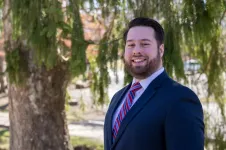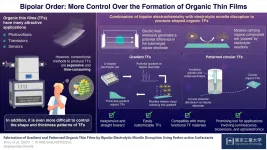Strengthening interpersonal relationships helps medical patients live longer
Support interventions such as group meetings and family sessions that promoted healthy behaviors resulted in a 29% increased probability of survival over time
2021-05-18
(Press-News.org) New research from BYU published in PLOS Medicine found that providing medical patients with social support leads to an increased chance of survival and elongation of life. Such findings come at a critical time as doctors and healthcare professionals seek new ways to improve care and decrease mortality.
"The premise of the research is that everyone is strongly influenced by their social context," said BYU counseling psychology professor Timothy B. Smith, lead author of the study. "Relationships influence our behavior and our physical health. We now know that it is possible to prolong life by fostering coping and reducing distress."
Julianne Holt-Lunstad, BYU psychology professor and co-author of the study, said the findings support other research published by the National Academy of Science and that there is now ample evidence that social needs should be addressed within medical settings.
"From pediatrics to geriatrics, physicians may encounter patients who are struggling. These data suggest that social interventions integrated within clinical treatments that help patients cope and reduce distress also improve their survival," she said.
The research analyzed data from 106 randomized controlled trials including over 40,000 patients to study the effects of having psychosocial support. Such group meetings or family sessions that promoted healthy behaviors by giving motivation to exercise, encouragement to complete medical treatments, or group support for diet adherence resulted in a 29% increased probability of survival over time.
"Providing medical patients with social support can be just as helpful as providing cardiac rehabilitation for someone recovering from heart disease," said Smith. "It can be just as helpful as a diet or lifestyle program for obese patients or treatment for alcoholism among patients with alcoholism."
The findings hold major implications for hospitals and healthcare administrators striving to improve patient care and survival. The research could be used to implement support programs in hospitals and clinics for patients, particularly those at risk of not completing treatments. It could also influence programs for family members or caregivers.
"We already had robust evidence that social connection and other social factors significantly influence health outcomes including risk for premature mortality, but it was unclear what can be done about it to reduce risk," said Holt-Lunstad. "Is it the role of healthcare, or should this be addressed outside the healthcare system? This research combined with the other consensus reports suggests that it is a role of the healthcare system."
"Ultimately, these data should be used to foster collaboration between medical professionals and mental health professionals," said Smith. "About half of all patient medical visits are about conditions that entail psychological considerations. Large hospitals now routinely hire psychologists to consult with physicians and to evaluate or work with patients, but more integration is needed in smaller hospitals and clinics."
The findings also hold important implications for medical patients. People respond differently to medical conditions. While some will immediately take action in rehabilitation or preventative measures, others might delay or even avoid engaging in prescribed healthy behaviors. On top of that, depression and anxiety rates can be high among patients, which can limit responsiveness to treatments, making social support efforts even more critical.
"We know that when hospitals implement a social support group, people simply live longer," said Connor Workman, a BYU student who assisted with the research during his undergraduate years. "The data show that relationships have a tangible effect on a person's mortality and health. This will give decision-makers at hospitals the information they need to start pushing out programs and implementing the right social connections for patients."
Workman was one of twenty BYU students who spent years of their undergraduate education at BYU working on this research project alongside Smith and Holt-Lunstad -- a mentored learning experience that will shape their future educational endeavors as well as their careers.
"It was pretty special to be part of the research team," said Bonnie Barton, another student who participated in the study. "I feel like I've gained more knowledge than my peers who weren't doing research like this. This has helped me feel more prepared for graduate school. I got way more out of my undergraduate experience because of this."
INFORMATION:
[Attachments] See images for this press release:

ELSE PRESS RELEASES FROM THIS DATE:
2021-05-18
ITHACA, N.Y. - Wines and table grapes exist thanks to a genetic exchange so rare that it's only happened twice in nature in the last 6 million years. And since the domestication of the grapevine 8,000 years ago, breeding has continued to be a gamble.
When today's growers cultivate new varieties - trying to produce better-tasting and more disease-resistant grapes - it takes two to four years for breeders to learn whether they have the genetic ingredients for the perfect flower.
Females set fruit, but produce sterile pollen. Males have stamens for pollen, but lack fruit. The perfect flower, however, carries both sex genes and can self-pollinate. These hermaphroditic varieties generally yield bigger and better-tasting berry ...
2021-05-18
Due to climate change, the average global temperature will rise in the coming decades. This should also significantly increase the number of so-called cooling degree days. These measure the number of hours, in which the ambient temperature is above a certain threshold, at which a building must be cooled to keep the indoor temperature at a comfortable level. The rising values may lead to an increased installation of AC systems in households. This could lead to a higher energy demand for cooling buildings, which is already expected to increase due to climate change and population growth.
Nip-and-tuck ...
2021-05-18
Scientists have long thought that there was a direct connection between the rise in atmospheric oxygen, which started with the Great Oxygenation Event 2.5 billion years ago, and the rise of large, complex multicellular organisms.
That theory, the "Oxygen Control Hypothesis," suggests that the size of these early multicellular organisms was limited by the depth to which oxygen could diffuse into their bodies. The hypothesis makes a simple prediction that has been highly influential within both evolutionary biology and geosciences: Greater atmospheric oxygen should always increase the size to which multicellular organisms can grow. ...
2021-05-18
When a person views a familiar image, even having seen it just once before for a few seconds, something unique happens in the human brain.
Until recently, neuroscientists believed that vigorous activity in a visual part of the brain called the inferotemporal (IT) cortex meant the person was looking at something novel, like the face of a stranger or a never-before-seen painting. Less IT cortex activity, on the other hand, indicated familiarity.
But something about that theory, called repetition suppression, didn't hold up for University of Pennsylvania neuroscientist Nicole Rust. "Different images produce different amounts of activation even when they are all novel," says ...
2021-05-18
The combination of a carb-heavy diet and poor oral hygiene can leave children with early childhood caries (ECC), a severe form of dental decay that can have a lasting impact on their oral and overall health.
A few years ago, scientists from Penn's School of Dental Medicine found that the dental plaque that gives rise to ECC is composed of both a bacterial species, Streptococcus mutans, and a fungus, Candida albicans. The two form a sticky symbiosis, known scientifically as a biofilm, that becomes extremely virulent and difficult to displace from the tooth surface.
Now, a new study from the group offers a strategy for disrupting this biofilm by targeting the yeast-bacterial interactions ...
2021-05-18
In studying COVID-19 testing and positivity rates in West Virginia between March and September 2020, West Virginia University researchers found disparities among Black residents and residents experiencing food insecurity.
Specifically, the researchers found communities with a higher Black population had testing rates six times lower than the state average, which they argue could potentially obscure prevalence estimates. They also found that areas associated with food insecurity had higher levels of testing and a higher rate of positivity.
"This could mean that public health officials are targeting predominately rural areas to keep tabs on how the pandemic will unfold in isolated communities within higher food insecurity," said Brian Hendricks, a research assistant professor with ...
2021-05-18
Australian scientists have compared an ancient Greek technique of memorising data to an even older technique from Aboriginal culture, using students in a rural medical school.
The study found that students using a technique called memory palace in which students memorised facts by placinthem into a memory blueprint of the childhood home, allowing them to revisit certain rooms to recapture that data. Another group of students were taught a technique developed by Australian Aboriginal people over more than 50,000 years of living in a custodial relationship with the Australian land.
The ...
2021-05-18
Researchers at Michigan Medicine found that people with venom allergies are much more likely to suffer mastocytosis, a bone marrow disorder that causes higher risk of fatal reactions.
The team of allergists examined approximately 27 million United States patients through an insurance database - easily becoming the nation's largest study of allergies to bee and wasp stings, or hymenoptera venom. The results, published in the Journal of Allergy and Clinical Immunology, revealed mastocytosis in fewer than 0.1% of venom allergy patients - still near 10 times higher than those without allergies.
"Even though there is mounting interest, mast cell diseases are quite understudied; ...
2021-05-18
Modern and emerging applications in various fields have found creative uses for organic thin films (TFs); some prominent examples include sensors, photovoltaic systems, transistors, and optoelectronics. However, the methods currently available for producing TFs, such as chemical vapor deposition, are expensive and time-consuming, and often require highly controlled conditions. As one would expect, making TFs with specific shapes or thickness distributions is even more challenging. Because unlocking this customizability could spur advances in many sophisticated applications, researchers are actively exploring new approaches for ...
2021-05-18
In quiet moments, the brain likes to wander—to the events of tomorrow, an unpaid bill, an upcoming vacation.
Despite little external stimulation in these instances, a part of the brain called the default mode network (DMN) is hard at work. "These regions seem to be active when people aren't asked to do anything in particular, as opposed to being asked to do something cognitively," says Penn neuroscientist Joseph Kable.
Though the field has long suspected that this neural network plays a role in imagining the future, precisely how it works hadn't been fully understood. Now, research from Kable and two former graduate students in his lab, Trishala Parthasarathi, associate director of scientific services at OrtleyBio, and Sangil Lee, a postdoc at University of California, ...
LAST 30 PRESS RELEASES:
[Press-News.org] Strengthening interpersonal relationships helps medical patients live longer
Support interventions such as group meetings and family sessions that promoted healthy behaviors resulted in a 29% increased probability of survival over time




